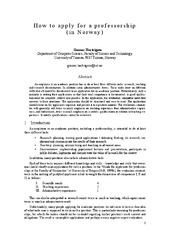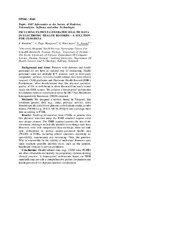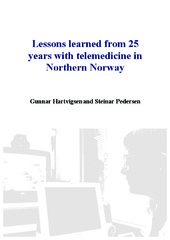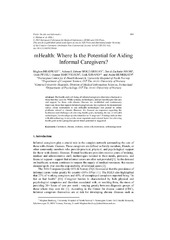Blar i forfatter "Hartvigsen, Gunnar"
-
Expectations of users and non-users of wearable sensors and mobile health applications
Henriksen, André; Pfuhl, Gerit; Woldaregay, Ashenafi Zebene; Issom, David-Zacharie; Årsand, Eirik; Sato, Keiichi; Hartvigsen, Gunnar (Chapter; Bokkapittel, 2022-08-22)Patient self-management is vital to improved health outcomes for patients with chronic diseases. The objective of this study was to understand the role of wearable sensors in patients’ self-management. A survey encompassing factors related to motivation in mHealth was conducted. Ease of use and sensory accuracy was found most important when choosing a wearable. Manual registration of most health-related ... -
Factors Influencing Motivation and Engagement in Mobile Health Among Patients With Sickle Cell Disease in Low-Prevalence, High-Income Countries: Qualitative Exploration of Patient Requirements
Issom, David-Zacharie; Henriksen, André; Woldaregay, Ashenafi Zebene; Rochat, Jessica; Lovis, Christian; Hartvigsen, Gunnar (Journal article; Tidsskriftartikkel; Peer reviewed, 2020-03-24)<i>Background</i>: Sickle cell disease (SCD) is a hematological genetic disease affecting over 25 million people worldwide. The main clinical manifestations of SCD, hemolytic anemia and vaso-occlusion, lead to chronic pain and organ damages. With recent advances in childhood care, high-income countries have seen SCD drift from a disease of early childhood mortality to a neglected chronic disease of ... -
Family members and health care workers' perspectives on motivational factors of participation in physical activity for people with intellectual disability: A qualitative study
Michalsen, Henriette; Wangberg, Silje C; Anke, Audny; Hartvigsen, Gunnar; Jaccheri, Maria Letizia; Arntzen, Cathrine (Journal article; Tidsskriftartikkel; Peer reviewed, 2020-01-21)<i>Background</i> - People with intellectual disabilities (ID) have lower levels of physical activity than the general population. The aim of this study was to understand the motivational factors of participation in physical activity for people with ID from the perspectives of the family members and staff.<p> <p><i>Method</i> - An abductive qualitative design was used. Social Cognitive Theory ... -
Features of Mobile Diabetes Applications: Review of the Literature and Analysis of Current Applications Compared Against Evidence-Based Guidelines
Chomutare, Taridzo; Fernandez-Luque, Luis; Årsand, Eirik; Hartvigsen, Gunnar (Journal article; Tidsskriftartikkel; Peer reviewed, 2011)Background: Interest in mobile health (mHealth) applications for self-management of diabetes is growing. In July 2009, we found 60 diabetes applications on iTunes for iPhone; by February 2011 the number had increased by more than 400% to 260. Other mobile platforms reflect a similar trend. Despite the growth, research on both the design and the use of diabetes mHealth applications is scarce. ... -
Health research requires efficient platforms for data collection from personal devices
Johannessen, Erlend; Henriksen, André; Årsand, Eirik; Horsch, Alexander; Johansson, Jonas; Hartvigsen, Gunnar (Journal article; Tidsskriftartikkel; Peer reviewed, 2023)Data from consumer-based devices for collecting personal health-related data could be useful in diagnostics and treatment. This requires a flexible and scalable software and system architecture to handle the data. This study examines the existing mSpider platform, addresses shortcomings in security and development, and suggests a full risk analysis, a more loosely coupled component- based system for ... -
The House of Carbs: Personalized Carbohydrate Dispenser for People with Diabetes
Randine, Pietro; Micucci, Daniela; Hartvigsen, Gunnar; Årsand, Eirik (Journal article; Tidsskriftartikkel; Peer reviewed, 2020)Patients with diabetes are often worried about having low blood glucose because of the unpleasant feeling and possible dangerous situations this can lead to. This can make patients consume more carbohydrates than necessary. Ad-hoc carbohydrate estimation and dosing by the patients can be unreliable and may produce unwanted periods of high blood glucose. In this paper we present a system that ... -
How to apply for a professorship at Norwegian Universities and University Colleges
Hartvigsen, Gunnar (Journal article; Tidsskriftartikkel, 2015-05)An employee in an academic position has to do at least three different tasks: research, teaching and research dissemination. In addition come administrative duties. These tasks draw on different skills that all should be documented in an application for an academic position. Unfortunately, only a minority is writing their applications so that their total competence is documented. A good application ... -
How to become a professor before you turn 40? (Alternatively – How to become a professor?)
Hartvigsen, Gunnar (Journal article; Tidsskriftartikkel, 2015-05)In Norway, where all associate professors (“førsteamanuensis”) who are qualified as a (full) professor are offered a personal professorship, it is no other than the associate professor him/herself who stands in the way of the Professor title. This article reviews 12 success criteria in order to achieve qualifications as (full) professor: (1) Accept professional challenges, (2) always consider ... -
Hvordan bli professor før du er 40? (Alternativt – Hvordan bli professor?)
Hartvigsen, Gunnar (Journal article; Tidsskriftartikkel, 2015-05)Med den norske opprykksordningen hvor alle med professorkompetanse gis et personlig professorat, så er det ingen andre enn den vitenskapelig ansatte selv som står i veien for professortittelen. I denne artikkelen gjennomgås 12 suksesskriterier for å oppnå professorkompetanse: (1) Ta imot faglige utfordringer; (2) tenk publisering; (3) barn bør ta tid; (4) begrens forelesningsforberedelser; (5) ha ... -
Including patient-generated health data in electronic health records – a solution for CGM-data
Randine, Pietro; Pape-Haugaard, Louise; Hartvigsen, Gunnar; Årsand, Eirik (Journal article; Tidsskriftartikkel; Peer reviewed, 2023)Patients with diabetes and health personnel do not have an optimal way of interacting. Health personnel must use multiple ICT systems, such as third-party companies’ services, to access health-related data from diverse vendors’ CGM platforms and Electronic Health Record (EHR). Furthermore, other health-related data like physical activities, quality of life or well-being is often discussed but ... -
Information and communication technology-based interventions for chronic diseases consultation: Scoping review
Randine, Pietro; Sharma, Aakash; Hartvigsen, Gunnar; Johansen, Håvard D.; Årsand, Eirik (Journal article; Tidsskriftartikkel; Peer reviewed, 2022-04-29)Background: Medical consultations are often critical meetings between patients and health personnel to provide treatment, health-management advice, and exchange of information, especially for people living with chronic diseases. The adoption of patient-operated Information and Communication Technologies (ICTs) allows the patients to actively participate in their consultation and treatment. The ... -
K-CUSUM: Cluster Detection Mechanism in EDMON
Yeng, Prosper; Woldaregay, Ashenafi Zebene; Hartvigsen, Gunnar (Journal article; Tidsskriftartikkel; Peer reviewed, 2019-11)The main goal of the EDMON (Electronic Disease Monitoring Network) project is to detect the spread of contagious diseases at the earliest possible moment, and potentially before people know that they have been infected. The results shall be visualized on real-time maps as well as presented in digital communication. In this paper, a hybrid of K-nearness Neighbor (KNN) and cumulative sum (CUSUM), known ... -
Lessons learned from 25 years with telemedicine in Northern Norway
Hartvigsen, Gunnar; Pedersen, Steinar (Book; Bok, 2015) -
Long-Term Engagement With a Mobile Self-Management System for People With Type 2 Diabetes
Tatara, Naoe; Årsand, Eirik; Skrøvseth, Stein Olav; Hartvigsen, Gunnar (Journal article; Tidsskriftartikkel; Peer reviewed, 2013-03-27) -
Measuring Physical Activity Using Triaxial Wrist Worn Polar Activity Trackers: A Systematic Review
Henriksen, André; Johansson, Jonas; Hartvigsen, Gunnar; Grimsgaard, Sameline; Hopstock, Laila Arnesdatter (Journal article; Tidsskriftartikkel; Peer reviewed, 2020)Collecting objective physical activity data from research participants are increasingly done using consumer-based activity trackers. Several validation studies of Polar devices are conducted to date, but no systematic review of the current level of accuracy for these devices exist. The aim of this study is therefore to investigate the accuracy of current wrist-worn Polar devices that equips a triaxial ... -
Measuring Physical Activity with Sensors : A Qualitative Study
Fisterer, Bernhard; Dias, Andrê Fernando; Hartvigsen, Gunnar; Lamla, Gregor; Kuhn, Klaus A.; Horsch, Alexander (Journal article; Tidsskriftartikkel; Peer reviewed, 2009) -
Measuring the effects of sharing mHealth data during diabetes consultations: a mixed-method study protocol
Bradway, Meghan; Giordanengo, Alain; Joakimsen, Ragnar Martin; Hansen, Anne Helen; Grøttland, Astrid; Hartvigsen, Gunnar; Randine, Pietro; Årsand, Eirik (Journal article; Tidsskriftartikkel; Peer reviewed, 2020-02-10)<i>Background</i>: There is rising demand for health care’s limited resources. Mobile health (mHealth) could be a solution, especially for those with chronic illnesses such as diabetes. mHealth can increases patients’ options to self-manage their health, improving their health knowledge, engagement, and capacity to contribute to their own care decisions. However, there are few solutions for sharing ... -
mHealth Support to Stimulate Physical Activity in Individuals With Intellectual Disability: Protocol for a Mixed Methods Pilot Study
Michalsen, Henriette; Wangberg, Silje C; Hartvigsen, Gunnar; Henriksen, André; Jaccheri, Maria Letizia; Jahnsen, Reidun Birgitta; Thrane, Gyrd; Arntzen, Cathrine; Anke, Audny Gabriele Wagner (Journal article; Tidsskriftartikkel; Peer reviewed, 2022-09-15)Background: Several studies have shown that individuals with intellectual disabilities (IDs) have low levels of physical activity (PA), and intervention studies on PA suggest inconsistent evidence. The use of technology as a means of motivation for PA has yet to be extensively explored and needs to be further investigated.<p> <p>Objective: We aim to assess the feasibility and acceptability of ... -
mHealth: Where Is the Potential for Aiding Informal Caregivers?
Bradway, Meghan; Woldaregay, Ashenafi Zebene; Issom, David-Zacharie; Pfuhl, Gerit; Hartvigsen, Gunnar; Årsand, Eirik; Henriksen, André (Journal article; Tidsskriftartikkel; Peer reviewed, 2021)The health and well-being of informal caregivers often take a backseat to those that they care for. While systems, technologies, and services that provide care and support for those with chronic illnesses are established and continuously improved, those that support informal caregivers are less explored. An international survey about motivations to use mHealth technologies was posted to online ... -
Mobile Phone-Based Pattern Recognition and Data Analysis for Patients with Type 1 Diabetes
Skrøvseth, Stein Olav; Årsand, Eirik; Godtliebsen, F.; Hartvigsen, Gunnar (Journal article; Tidsskriftartikkel; Peer reviewed, 2012)Persons with type 1 diabetes who use electronic self-help tools, most commonly blood glucose meters, record a large amount of data about their personal condition. Mobile phones are powerful and ubiquitous computers that have a potential for data analysis, and the purpose of this study is to explore how self-gathered data can help users improve their blood glucose management. Thirty patients with ...


 English
English norsk
norsk


















